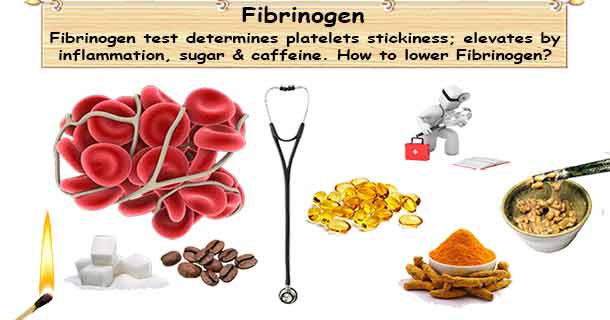Fibrinogen is a protein in the blood; it determines the platelets stickiness. Fibrinogen is a predictor of cardiovascular risk.
Fibrinogen determines platelets stickiness
Adequate level of fibrinogen is must to stop bleeding when injured. But, an excess of it leads to unnecessary clotting and disturbance of blood circulation.
Fibrinogen is a protein in the blood; it determines the platelets stickiness. During injury, you need adequate fibrinogen level to stop bleeding by forming a blood clot. But, fibrinogen should be within the limit. Otherwise, unnecessary clotting and disturb optimal blood circulation. This test is not preferred; because there is no treatment to lower it if elevated. The normal healthy fibrinogen range is 200 to 400 mg/dL.
Fibrinogen may elevate during inflammation. During the initial phase of the periodontal disease, especially noticeable in gingival tissue. Neonates healthy fibrinogen range is within 125-300 mg/dL (1.25-3 g/L). Fibrinogen levels increase during pregnancy to an average of 4.5 g/l. Fibrinogen level of non-pregnant women is in an average of 3 g/l.
- Optimal: between 150 to 400 mg/dL (1.5 to 4.0 g/L)
- High risk: over 400 mg/dL (>4.0 g/L)
"Dietary Factors Related to Higher Plasma Fibrinogen Levels of Japanese-Americans in Hawaii Compared with Japanese in Japan" published in Arteriosclerosis Thrombosis Vascular Biology. 2006; 26: 1674-1679. Higher intake of iron, sugar, and caffeine along with obesity raises fibrinogen levels.
High Fibrinogen danger
High fibrinogen may increase cardiovascular risk by platelet aggregation, fibrin formation, and plasma viscosity. Elevated fibrinogen level increases the risk of blood clot. Over time, leads to increased risk towards cardiovascular disease.
High Fibrinogen causes
Fibrinogen is must to stop bleeding when injured. Likewise, if there is an internal injury fibrinogen in blood raises to stop in the event of bleeding.
Elevated levels of Fibrinogen may be due to
- Acute infection,
- Cancer,
- Coronary heart disease & myocardial infarction
- Stroke,
- Inflammatory disorders (rheumatoid arthritis and glomerulonephritis - a form of kidney disease),
- Trauma,
- Cigarette smoking,
- Pregnancy, and
- Peripheral artery disease.
Fibrinogen elevation is common among cigarette smokers. It has been identifying as a primary mechanism causing heart disease and stroke. Cigarette smoking increases cardiovascular disease risk and raises fibrinogen levels. Quitting smoking might help slight reductions of fibrinogen levels.
How can you lower Fibrinogen? 9 nutrients are helpful!
Nattokinase acts like blood thinner; thus, it prevents unwanted clotting and lower fibrinogen.
“Nattokinase decreases plasma levels of fibrinogen, factor VII, and factor VIII in human subjects” published in Nutrition Research 2009 Mar;29(3):190-6. doi: 10.1016/j.nutres.2009.01.009. Natto is a traditional Japanese food made from soybeans fermented with Bacillus subtilis. Nattokinase is a serine protease from Bacillus subtilis. It is considering as one of the most active functional ingredients found in natto. Nattokinase could reduce certain factors of blood clotting and lipids. In summary, this study showed oral nattokinase could lower plasma fibrinogen level and CVD.
Studies show Omega-3 fatty acids has hypo-coagulant property. It is useful to lower fibrinogen and reduce your heart attack risk.
Omega-3 fatty acids may also help when there is high fibrinogen. Taking 3000 mg/day of fish oil shown to lower fibrinogen levels. Fish oil shows to reduce heart attack risk. Additionally, reduce triglycerides, suppress inflammation, decreased platelet stickiness, and protect against arrhythmia.
"Variable hypo-coagulant effect of fish oil intake in humans: modulation of fibrinogen level and thrombin generation" published in Arteriosclerosis Thrombosis Vascular Biology. 2004 Sep;24(9):1734-40. Epub 2004 Jun 24. Intake of fish oil reduced fibrinogen, factor V levels, and thrombin generation in plasma. Thus, dietary fish oil can provoke a hypo-coagulant effect depending on the fibrinogen level.
Differential effects of dietary supplementation with fish oil or soy lecithin on human platelet adhesion. Thrombosis Haemostasis 1999 Nov;82(5):1522-7.
Studies have demonstrated Niacin (vitamin B3) can help lower fibrinogen.
If you can tolerate unpleasant side effects of niacin, then niacin can help lower fibrinogen. "Effect of niacin supplementation on fibrinogen levels in patients with the peripheral vascular disease." American Journal of Cardiology 1998 Sep 1;82(5):697-9, A9. "Nicotinic acid treatment shifts the fibrinolytic balance favorably and decreases plasma fibrinogen in hyper-triglyceride men." Journal of Cardiovascular Risk 1997 Jun;4(3):165-71.
Vitamin C lower your coronary artery disease risk by decreasing platelet aggregation.
Vitamin C supplementation of 2000 mg/day can increased fibrinogen breakdown by 45%. Additionally, it reduces platelet aggregation by 27% and total cholesterol by 12%. Ref: "The effect of vitamin C on blood lipids, fibrinolytic activity and platelet adhesiveness in patients with coronary artery disease." Atherosclerosis. 1980 Feb;35(2):181-7.
Anti-inflammatory Turmeric can lower high fibrinogen.
Eight subjects with elevated fibrinogen levels treated with 20 mg/day of turmeric extract. After 15 days, fibrinogen dropped in all eight subjects. "A hydroalcoholic extract of Curcuma longa lowers the abnormally high values of human plasma fibrinogen" published in Mechanisms of Ageing and Development 2000, 114: 207-220.
Green tea, ginkgo, garlic and vitamin E have an inhibitory effect on platelet aggregation.
References:
- "Antithrombotic activities of green tea catechins and (-)-epigallocatechin gallate." Published in Thrombosis Research 1999 Nov 1;96(3):229-37.
- "Actions of Ginkgo Biloba related to potential utility for the treatment of conditions involving cerebral hypoxia." Published in Life Sciences 2000 Aug 11;67(12):1389-96.
- "Dietary supplementation with aged garlic extract inhibits ADP-induced platelet aggregation in humans." Published in Journal of Nutrition 2000 Nov;130(11):2662-5.
- "Specific cellular responses to alpha-tocopherol." Published in Journal of Nutrition 2000 Jul;130(7):1649-52.
Maintaining blood sugar A1C below 4.6% can lower your risk towards coronary heart disease.
Contrary to conventional wisdom, we advised trying to keep their glucose levels at 85 mg/dL or lower. Based on recent findings, an ideal reading of hemoglobin A1C is 4.5% or lower. Ref: "Glycemic control and coronary heart disease risk in persons with and without diabetes: the atherosclerosis risk in communities’ study". Published in Archives of Internal Medicine 2005 Sep 12;165(16):1910-6.
The proteolytic enzyme bromelain may be the most effective fibrinogen-lowering supplement.

